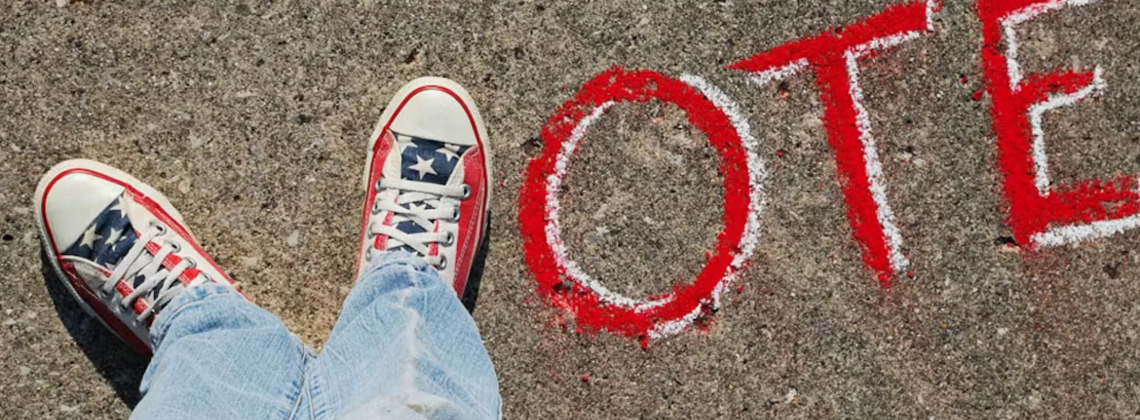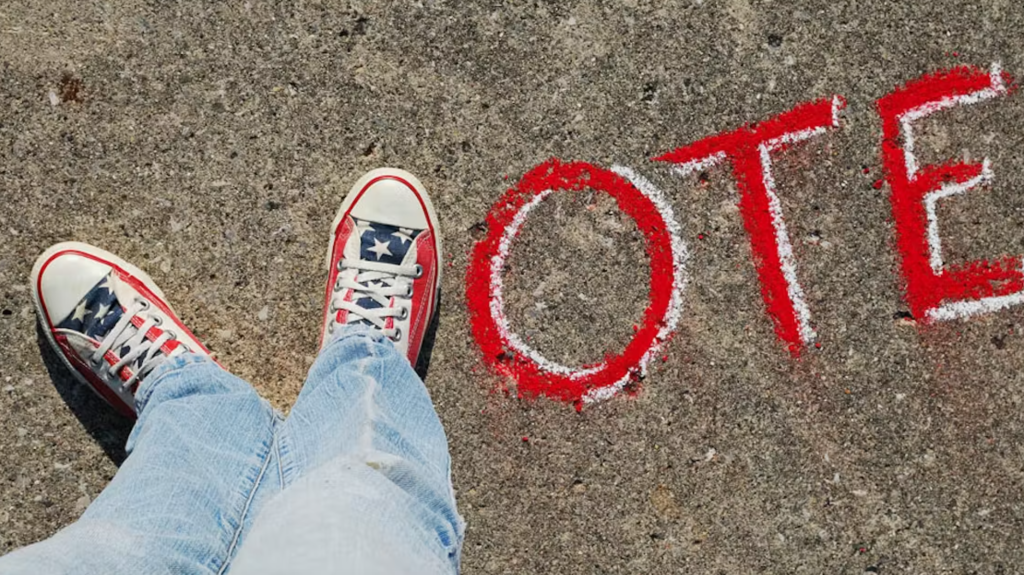

We need their hopefulness
In the final episode of the classic comedy Derry Girls, the almost eighteen-year-old Orla gets her voter registration card. As a teenager living in Northern Ireland in 1998, she will soon have the opportunity to vote on the Good Friday Agreement, a possible end to The Troubles. It is one of the most serious decisions she will make in her life, but because it is Orla her voter ID has a very silly picture of her. Teenagers, right? The further away you get from eighteen, the crazier it seems that they can vote.
But there is real value in the youth vote.
When we discuss the youth vote, we often emphasize that they have the right to vote because their future is being decided. They will have to live most and longest with what follows. In the final episode of Derry Girls, the grandfather acknowledges this idea, that it’s the girls’ future, and he imagines their old age: “What if this all becomes a ghost story you’ll tell your wains one day?” (wains being small children). It is logical that youth should have some political say in their future. The eighteen-year-old voting age in the U.S. acknowledges the reality that eighteen-year-olds can, and have been, drafted to serve their country. But it is not just fair that eighteen-year-olds vote. It is good.
Older voters often over-assume the importance of experience. As our own personal narrative grows longer and we continue to revise it, we may overemphasize the wrong things or remember the wrong lessons. We tell ourselves false stories about why things happened. It is also the case that we often project our personal experiences onto the world, expecting our own lives to be good guides. The longer we live, the more of a guide for interpreting the world we have, whether or not it is any good. We have more baggage than younger voters; sometimes we mistake it for a compass.
While living in the present, many older citizens vote according to the past. Some of us are voting based on the parties and politicians we used to know. We can ignore and overlook rhetoric and voting realities because we are balancing what is against what was. Younger voters sometimes see what is more clearly than we do. They may know less about the past than we would like, but for that very reason younger voters may be less likely to be taken in by it.
Younger Americans also have more invested in America and get more done than many people realize. People in their teens and twenties defeated our enemies in World War II. People in their twenties provide most of our entry-level work, which is not well-compensated but makes the place run. How many young people with supposedly unimportant jobs became “essential” during COVID restrictions? Younger people may not have families of their own or houses of their own or pay much in taxes, but those things are true of many people of different ages. Young people idealistically teach in our public schools, single people volunteer more than marrieds, and young people are the bulk of our armed forces. They contribute much and are thanked little.
Yet one of the most important things that younger voters bring to the table is optimism. They believe that things will work out. They often have very high hopes. The Pew Research Center has found that for eighteen- to thirty-four-year-olds, the economic situation today is not ideal, but people in that demographic remain optimistic: “Nearly half of all young adults (49%) say their age group is having the hardest time, but even in the teeth of their own downbeat assessment, their long-term economic optimism remains notably unscarred by current travails.” Older Americans are doing better, but have dimmer hopes for the future. When you are young and so much of life seems to be ahead of you, you can have higher expectations for it and the number of possibilities can seem tremendous. As you age, your opportunities can decline alongside your bone density, and you can project your own prospects onto the world. We bring those perspectives into the voting booth.
Optimism has its critics. Some consider it irrational. Some consider it a temperament, perhaps a faulty one. Some optimism might ignore troubling realities in ways that significantly harm the future—believing that things will work out could allow a problem to get beyond being resolvable. However, the optimism of youth—even if it is sometimes irrational—is typically empowering. Belief that things can and likely will work out is why people go to college, start businesses, attempt world records, begin relationships, fight wars, have children, and do all the kinds of things that make the world turn well.
Contra the charge of supposed realists, believing that the future can be good, betting that it will be, is not simple naivete. In her essay, “What is Freedom?” Hannah Arendt described freedom as the “the sheer capacity to begin, which animates and inspires all human activities and is the hidden source of production of all great and beautiful things.” This freedom exists even “when political life has become petrified.” We can see freedom in action in what Arendt calls “miracles,” which she defines as “interruptions of some natural series of events, of some automatic process, in whose context they constitute the wholly unexpected.” These miracles are when someone interrupts a system that seems to be running unstoppably on inertia. Solidarity in Poland in the 1980s was a miracle. The small-scale actions of resistance described by Václav Havel in Power of the Powerless were miracles. The Good Friday Agreement was a miracle. These were interruptions that seemed impossible. Until they happened.
Arendt believed that not only are miracles possible and desirable—they ought to be expected. Optimism believes that a better future is possible even where it is not very probable. That optimism makes a difference, because Arendt’s miracles in human affairs are made by people. She writes of “men who because they have received the twofold gift of freedom and action can establish a reality of their own.” You do not have to be twenty to have this kind of optimism and you can be twenty without it, but it is more common among twenty-year-olds than it is among fifty-year-olds.
When it comes to America, right now we under-imagine the future. We are surrounded by doomsday preppers and despairing middle-aged voters. We are rich, but we act poor. Older people engage in “civil war” rhetoric and denigrate our institutions while they rely on Celebrex and Social Security. Younger voters help balance our national perspective. Their good experiences of life are just as real as others’ experiences. Their futures are bigger. Perhaps most importantly, their optimism encourages miracles, which we always need and which they best consistently expect.
Elizabeth Stice is a professor of history at Palm Beach Atlantic University, where she also serves as the assistant director of the Honors Program. She is the author of Empire Between the Lines: Imperial Culture in British and French Trench Newspapers of the Great War (2023). In her spare time, she enjoys ultimate frisbee and putting together a review, Orange Blossom Ordinary.